#railroading everyone into what really happened is just as bad as the opening sequence.
Explore tagged Tumblr posts
Text
I really love the idea of synth Sole for fallout 4 because it allows narrative reason for the aggressively nostalgic opening while still allowing for roleplaying and more diverse headcanons.
Like of course you're depicted as a loving spouse who cares deeply for your child. Your memories are a direct creation of your "son" and what kid wouldn't imagine the family that they could've had as idealistically as possible? It's way easier to treat the opening as wishful thinking instead of what actually happened.
#also explains why any rational adult would give a literal infant a tricycle#the memory was created by someone who has never had to deal with small children#i wish there was an optional quest line where you could realize youre a synth and search for clues about youre real past life#but it makes sense not to#railroading everyone into what really happened is just as bad as the opening sequence.#but itd still be fun#fallout 4#synths
84 notes
·
View notes
Text
Every Game I Played in 2020, Ranked
2020. Boy, what a garbo year huh? Didn't actually play that many games this year all-in-all. Happens! My backlog is getting pretty big, but I just find it hard to focus on games when I could be working on something. Or put off working on something, as it may happen to be at times.
My arbitrary decision from years ago to only attach a numbered ranking to same-year releases is getting increasingly silly, especially given my propensity to wait on playing games until I’m in the right mood, but whatever. That order matters than the dumb numerical numbering anyway.
2015 | 2016 | 2017 | 2018 | 2019
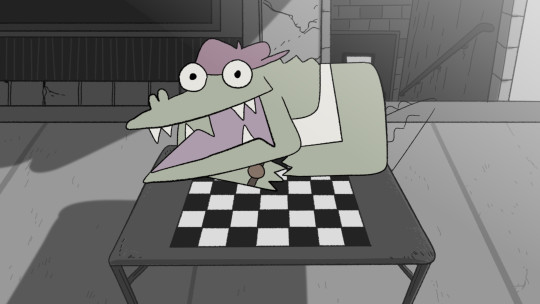
Later Alligator – 2019 – Steam – ★★
The style of this game is very cute, and the jokes are funny enough. But… ok, look, I’m not one to be precious about what is or isn’t a game. But this really isn’t a game. It’s a series of disconnected, unrelated challenges clipped from Atari Free Mini Game Collection 100, wrapped in a very non-interactive adventure-game. It’s cute, it’s kind of sweet, but it’s dull. Dull dull dull. There’s a pointless, mandatory sliding block puzzle early on that infuriated me by its mere existence. Them giving the ability to skip it because “wow you’re bad at this huh”, which, while accurate, also just sold the whole point meaningless of the “““interactive experience”””.
Also: when a huge part of your game is WOW WE ANIMATED EVERYONE REALLY GOOD, text boxes that reveal word-by-word, far away from the animations that occur when said characters talk? Kind of stinks!
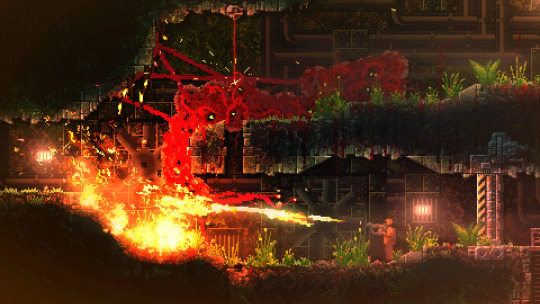
8. Carrion – 2020 – Steam – ★★
What Carrion does well— the whole “You’re controlling The Thing and just rippin’ people apart!” shtick— is really neat. They made that bootleg The Thing animate real-ass good.
The actual game as a whole though? Kind of garbage. Imagine a Metroidvania with zero actual exploration, where every opportunity you have to venture off the path instead results in immediate railroading with constant, utterly inexplicable one-way pipes. It’s not that it’s linear, it’s that it actively slaps you when you attempt to explore. It’s very frustrating! Add the fact that the tentacle-monster-shtick makes challenging to actually, y’know, move around and control all your bits… the only reason I finished the game was due to foreknowledge of its extreme brevity.
I think if the game were more open and less obsessed with constantly handing out upgrades, as well as having less of a focus on pure combat, I think I’d have enjoyed it more.
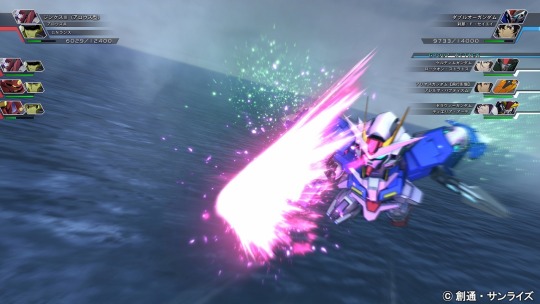
SD Gundam G Generation Cross Rays – 2019 – Steam – ★★
It is well documented at this point that I am both an active Gundam fan, and as well as an on-again-off-again tactical RPG aficionado. A SD Gundam game appearing on Steam with a good English translation and localization is… exciting, to say the least. That said, I have never had much context for this game series beyond the basic facts that the combat tended to be pretty well animated CG, and that it’s vaguely similar to Super Robot Wars. Turns out… it’s really different from SRW? I dunno how the rest of the series fairs, but Cross Rays is weird as hell.
For one, there’s zero tutorialization at all. None. Almost all of what I’m going to explain here is me figuring stuff out by trial and error, or by reading junk online. Gundam is insanely popular, you’d think they’d be interested in explaining how it all works, but… nope. Even Super Robot Wars has multi-level introductory bits for new folks to show them the rope these days.
So: Cross Rays is a tactical RPG where you can playthrough the storyline of various Gundam AUs. You can play through them in any order. These playthroughs are fairly literal translations of the stories. You take control of the lead mecha from those series, fight enemy mobile suits that show up in SRW-like tactical RPG combat, until all reinforcements cease. Pretty straight forward. There are occasionally mission variants like “prevent enemies from reaching X” or “prevent enemies from destroying Y”, but even those can be just reduced to “kill everything very quickly please.”
But here’s the thing: while there is a story progression, the characters in the story itself actually have no character progression. These characters and mecha are actually considered guests, despite it being ostensibly their story. Instead, you are able to field “permanent” mecha and pilots of your own choosing, which do have progressions. There is no plot justification for this or anything like it. The game does not recognize that it’s weird that during Iron-Blooded Orphans intro where nobody knows what a Gundam even is, you can have 25 Gundams show up at once and just fire lasers at everything. That’s because this game is actually about repeatedly grinding the same set of missions over and over.
Pilots are recruited by completing certain in-mission requirements. Mecha are acquired by either by getting enough kills with the progression-less “guest” mecha, combining mecha you already have gashopon-style, completing certain quests, or by leveling up mecha and then “evolving them”. This is the actual core of the game.
SD Gundam G Generation Cross Rays is basically Disgaea, it turns out? You’re grinding story missions at various difficulty levels in order to complete missions, try to recruit specific pilots, equip them with stats and levels to make them stronger, and then hitting mecha together in a sort of quasi-SMT fusion system until you get all the powerful mobile suits you desire.
The combat itself is kind of… bland? There’s a lot of systems, but they mostly seem in service of making an already easy game easier, or burning through tedium. There are four different difficulty modes, because there’s not actually that many different missions you can play through. The expectation is you’ll just work your way through every story beat while ramping the difficulty up over time to where the “guest” mecha would not be able to handle on their own. In fact, letting the story mecha act out the story beats is actually bad after a point, unless you’re still trying to get those lead mobile suits, or if you’re trying to complete some mission requirement in order to recruit Named Wing Grunt Pilot #246.
There is something to the notion of “I want to get N and N and N and N on a team, piloting weird but powerful mobile suits, and just solo every Gundam AU in a row,” but the whole premise seems kind of against purpose. Why bother recreating story beats at all, then? It’s not like the game even acknowledges any of that going on.
If the point is that I’m supposed to be, like in other grind-heavy tactical RPGs, breaking the systems to my own end in order to proceed… why not make the missions you play challenges focused towards that? The story progression literally only exists to facilitate the mission-based unlock conditions, which makes all the energy put into making them JUST LIKE THE ANIME really damn pointless.
I like tactical RPGs, I like breaking RPG systems so as to beat hard challenges (I beat all the insanely hard extra bosses in FFXII for crying out loud), I looooove Gundam. I should like this. But I don’t really have the “god, I NEED TO FILL THIS LIST” gene that some folks have… except as an excuse to continue to engage in gameplay I enjoy. The gameplay here seems in service of the collection, rather than the way around.
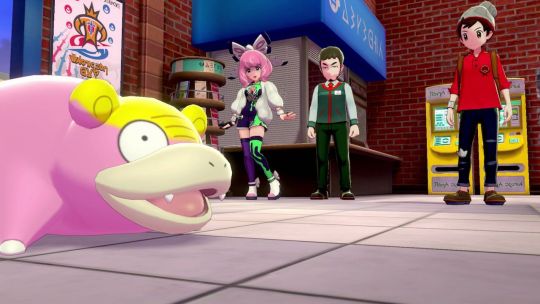
7. Pokemon Sword: The Isle of Armor – 2020 – ★★★
Pokemon’s first foray into actually doing DLC is… a mixed bag. As a positive, they’ve improved the Wild Area concept I liked from the main game, and even brought back buddy Pokemon walking behind you. That’s neat. On the other hand: the actual progression in it is completable in like an hour, it doesn’t scale with you, so you’re bound to be over leveled for it, and all the raid stuff, while still conceptually neat, is just as flawed as in the base game. And so, you’re just left with even more new Pokemon to RNG grind on to continue to catch-them-all. Nah, I’m good.
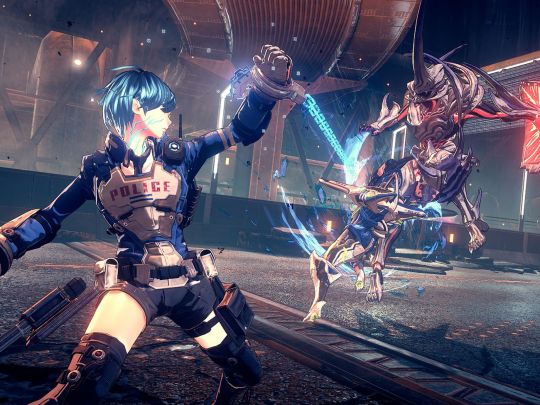
Astral Chain – 2019 – Switch – ★★★
Platinum knows how to make good character action games. They’ve made a bunch of them. Bayonetta, Nier: Automata, Metal Gear Rising: Revengeance. They also know how to make some kind of mediocre character action games. Transformers: Devastation, Wonderful 101, their various shovelware character action games like Korra. Astral Chain falls somewhere in the middle, I guess?
Astral Chain has all the production of their good games. It has some stylish, cool action. It has a neat core mechanical idea, in that it’s essentially a two-character action game where you control both characters at once. It has a lot of the old mechanics from some of their best games brought in; witch-time last second dodging from Bayonetta, Nier’s shooting-and-slashing combination, the Zandatsu mechanic from Metal Gear Rising, even Wonderful 101’s multi-unit shenanigans. The setting is different, and there’s some neat world flavor all in all.
But, of all games I’ve played over the past few years, Astral Chain made me more vividly angry than any other. It’s not that it’s too hard— far from it, really, I found its combat incredibly mashy. No, the problem is that it has so many shitty mechanics slathered on that it become a chore to get to the “good bits”.
Why would you put forced stealth sequences in your character action game, especially when your movement controls are not suited for it?
Why the HELL would you put platforming sections in your character action game, constantly, especially when your stupid ghost buddy can accidentally yank you off the edge, your auto-combos can just throw you off the edge, or literally anything can knock you off the edge and make you lose life?
Why would you put so many constant excuses into the world to force me use the digital sensor in the game, that also makes it miserable to walk around while using it?
WHO THE LIVING FUCK THINKS THESE SHITTY BOX BALANCING MINI-GAMES ARE FUN???
These games are supposed to encourage me to perfect everything, right? Why keep putting fucking fights you need to complete in order to get an S rank behind backtracking, or Legions I don’t have yet? That isn’t adding replayability, that’s just wasting my time. There are even in-level missions that have fail conditions that you never even know about. Surprise!!! A lot of them involve chasing after guys and catching them with your chain, which is really obnoxious to do!!!! SURPRISE!!!!!!!!!!!!!!
The story is just Bad Evangelion, straight up. Every story beat from Evangelion is here, executed worse. They also make your character have a twin just so they can have a character who can talk and feel emotions, because your boring-ass protagonist is stuck being an emotionless audience cipher. Cool!!!
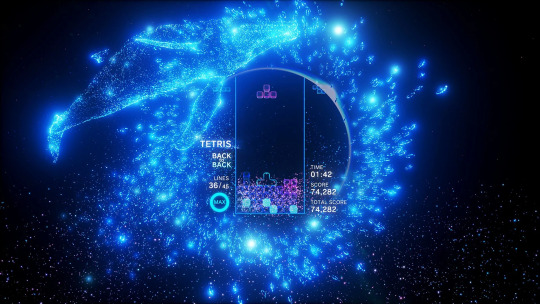
Tetris Effect – 2018 – Origin – ★★★
It’s drugs Tetris. I personally don’t use, or have synesthesia for that matter. I imagine this game is better if you do. It’s an enjoyable enough experience but it feels incredibly slight for what I was expecting from it, or even compared to something like Lumines, which has tons of replayability by way of its difficulty. Tetris just isn’t that hard, unless you’re forcing yourself to do weird shit to get points. I WILL NEVER LEARN HOW TO T-SPIN. Never.
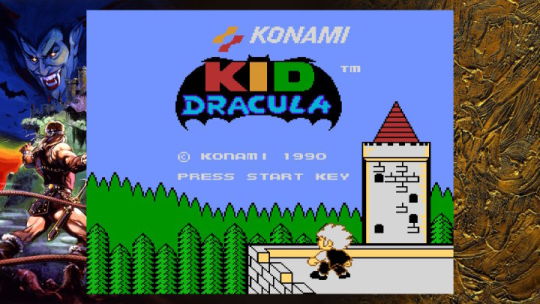
Castlevania Anniversary Collection – 2019 – Steam – ★★★
Kind of an unremarkable Castlevania collection. Neat that it has an official translation of Kid Dracula in there, but also… look, I prefer Metroidvania Castlevanias, OK?
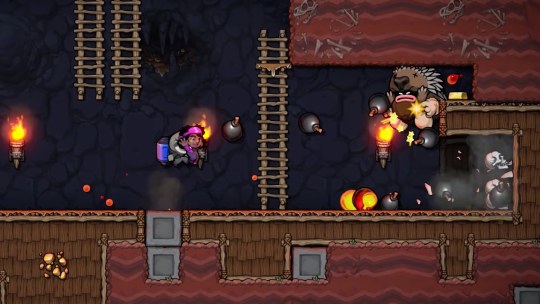
6. Spelunky 2 – 2020 – Steam – ★★★
I’m not entirely sure why this doesn’t click for me where Spelunky 1 did. More annoying intro levels? Too many fiddly requirements for different ending-progression? Gameplay additions that just make things more annoying? Spelunky 1 was hard, but there was a kind straight-forwardness to it, even with its weird secrets, that made it much easier to grok and continue banging your head against. I’m just not having as much fun with this. Difficulty should be challenging, not a hassle.
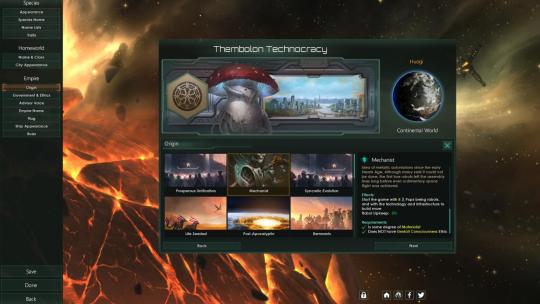
5. Stellaris: Federations – 2020 – Steam – ★★★
This is the year that Stellaris just broke for me.
Federations itself is a good DLC; it adds some really interesting mechanics tied to various types of multi-national unions (the titular federations, as well as the Space UN), as well as the addition of unique “origins” that allow you to further specialize your gameplay. The origins in particular are a great addition that allows more specialization and roleplay.
I’m just tired of the sheer amount of busywork Stellaris forces you to do. Every DLC adds more junk you need to keep an eye on, and the fact that the AI doesn’t even bother with it (compensating with copious economy boosts in order to keep up) makes the whole thing frustrating. It’s like playing fetch with yourself; you just get tired of chasing after your own ball after a point.
I have to wonder if they’re pivoting towards a notional Stellaris 2 at this point? Might not be a bad idea for them, though it is weird with all they talked up adding more origins when Federations came out.
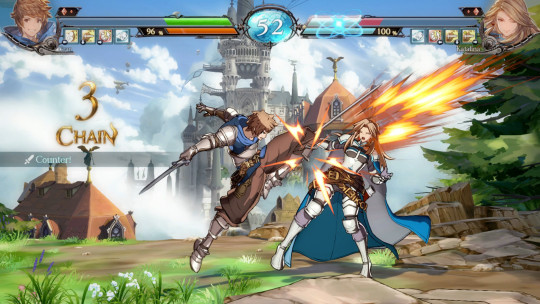
4. GranBlue Fantasy Versus – 2020 – Steam – ★★★★
This is probably the fighting game I got most into over the past few years. There’s just this nice, almost Street Fighter-esque ease of execution to the controls, and that Arc Systems Works 3D-as-2D style continues to just do work. I don’t give a single shit about GranBlue Fantasy (frankly, I think I’d enjoy this game more if it wasn’t attached to a property) but the characters are fun enough to play and look at.
The big problem here is two things: no crossplay, and no rollback netcode. In the span of a month, this game became a total ghost town on PC, and it doesn’t sound like PS4 faired that much better.
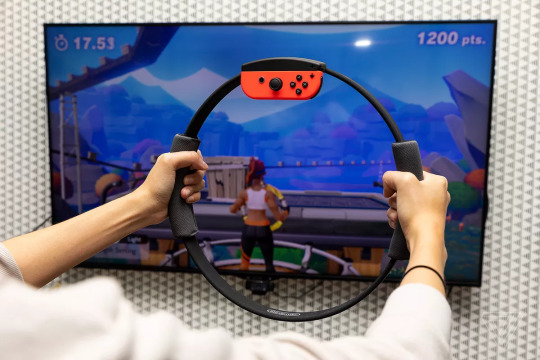
Ring Fit Adventure – 2019 – Switch – ★★★★
I’ve fallen on-and-off this game all year. At its heart: it works, it’s a fun exercise game. I don’t think it really feels like a “game” (in the sense that I’m not really coming to it for riveting gameplay or anything) as much as just a guided exercise experience, but… that’s fine? The in-game story is kind of flat, but funny in the fact of it existing at all. Buff Nicol Bolas and all.
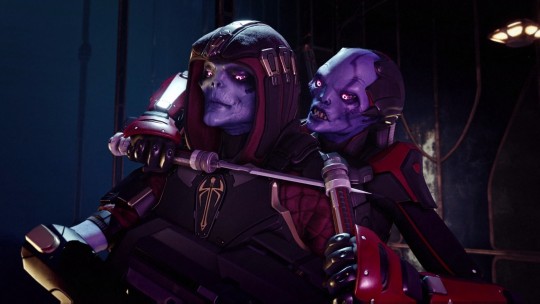
XCOM 2: War of the Chosen – 2017 – Steam – ★★★★
XCOM2: War of the Chosen is a great answer to what XCOM2 struggled with. As I discussed back in 2016 (Jesus Christ), XCOM2 tried to push against player’s worst instincts by incentivizing them to keep being aggressive through a whole bunch of timers— which, kind of just weren’t fun given how much accidentally walking into an ambush could “ruin” dozens of hours of play. War of the Chosen dials that back in some intelligent ways, by instead making the encounter designs themselves, as well as much more grab-and-bail mission types, encourage players to push ahead instead. Smart!
The addition of the Chosen makes the game feel more alive, and they really do make missions harder— particularly early on. But they’ve somehow accidentally fell into the hole, where XCOM just… isn’t that hard? Early on it’s challenging, particularly with the resource restrictions and all. But they keep giving you more and more options (that aren’t especially meaningful choices) that make your team more and more powerful, without increasing the strength of the enemy as time goes on. By the five-hour mark, you basically know if you’re going to steam roll the game or not.
The amount of additional character and variety in the gameplay is great, I just wish it had a more challenging difficulty curve. Maybe make the meta-layer of when enemies show up more targeted to where players are at. If a player is doing well, ramp up the difficulty, if they’re struggling, pull it back a bit. I should always feel like I’m just barely keeping ahead with XCOM, not like I’m bored. And by the end of War of the Chosen, I was kind of getting bored, really. Oh well.
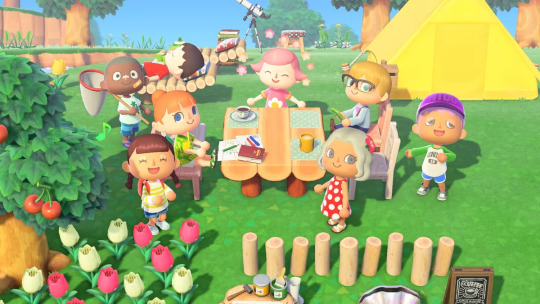
3. Animal Crossing: New Horizons – 2020 – Switch – ★★★★
This is probably the video game that I spent the most time with hours-wise this year. I’m not entirely sure why? It’s a nice evolution of New Leaf, in that the crafting, environment shaping, and general quality-of-life improvements made are quite nice. There’s clearly been some thought on how people play these games, and ways to make the experience less frustrating.
… and yet, they kept so much tedium in the game. Like yes, the schedule stretching is the point, I get it. As someone who for some reason decided not to play with the clock, I only just recently finished the fish, fossils, and insects for the museum. But there’s just so many weird, little things that just make it hard to keep coming back to it. It’s like… to what end? When I’ve unlocked everything, and basically seen the entirety of the item list at this point, and the holiday events all being the game meaningless collectathons…. Why? I’m not going to try completing the collection; the museum stuff is about my limit, really (and even the paintings I can probably pass on).
I guess even an idealized, digital representation of a quasi-domestic life has the spiritual emptiness of consumerism-for-consumerism sake. Thanks???
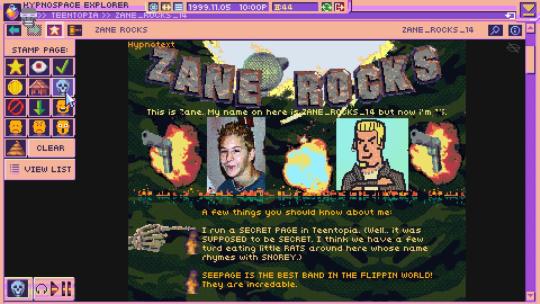
Hypnospace Outlaw – 2019 – Steam – ★★★★
I grew up on the internet of the early 00s. I had an AngelFire website, mostly consisting of shitty sprite webcomics and hosted Gundam pics. I remember when Google wasn’t really a thing and you would heavily rely on website compilation sites like the Anime Web Turnpike in order to find anything of value online. It was weird, it was wild. It was exciting!
The internet seemed so different back then. There was a ton of garbage online, but also, like… there was a sense of optimism to it. Folks were shitty, there was plenty of bad stuff online, but it felt so disconnected from the fabric of the physicality of real-life that it was at the same time a perfect escape.
I was young when I first got “online”, something like 12. I remember having this notion that the internet was going to be this great equalizer, that it had infinite potential to change how people behave and interact. Boy, huh.
Hypnospace Outlaw is essentially a splendid alternate universe GeoCities recreation, where you’re a volunteer moderator of a grouping of websites on HypnOS, an internet-analog you access while you are sleep. At the surface level, it’s mostly about poking around the weird alternate-historical version of the internet they created, full of kids feuding, bizarre historical divergences, and plenty of amazing bespoke weirdness. All of this is great; there’s an incredible amount of content that’s just great to poke at, listen to, and explore.
Below the surface, there’s also a rolling plotline about the ethics of this industry-owned platform, those who run it, and the way corporations handle new technology, new platforms, and emerging digital societies. There’s a late game turn that’s pretty damn affecting. And as someone who has moderator his share of internet forums in his time, trying to balance ‘do it for the community’ and what your ostensible ‘bosses’ require of you, it was kind of a weird throwback in more ways than one.
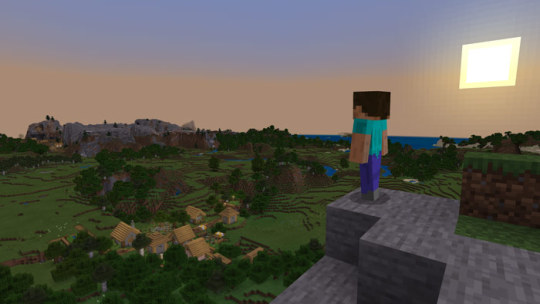
Minecraft – 2011 – PC – ★★★★★
Turns out, Minecraft is really as good still who knew??? Started playing a bunch more of it this year due to Giant Bomb deciding to do so, and yeah: still good!
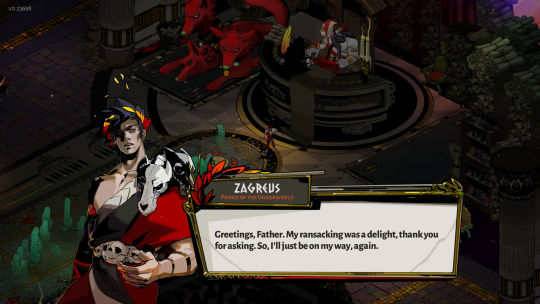
2. Hades – 2020 – Steam – ★★★★★
I’ve said it before, and I’ll say it again— Supergiant makes damn good games. I’d been holding off on checking out Hades until its full release due to my tendency to burn out on games easily, and I’m glad I waited. Hades is a fantastic rogue-lite experience. The way it makes narrative progression part of the reiterative, randomized rogue-lite structure is just perfect.
It’s got all the usual Supergiant bullet points. Great characters, voice acting, narration, and music. In terms of gameplay, it’s probably their least ambitious game— playing something like a cousin to their original game, Bastion— but it’s also been polished to a mirror sheen. It just feels really damn good to play, over and over and over.
That being said, the second (final?) ending feels kind of…. Tacked on? It’s fine as a goal to go for while continuing to do the game’s relationship mechanics for additional story bits, but it ends up feeling kind of unfulfilling compared to the payoff of the first one.
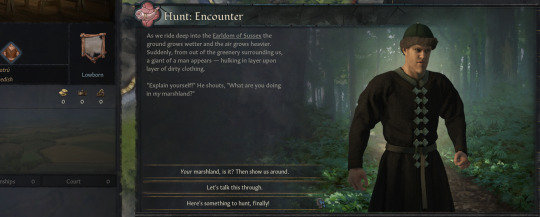
1. Crusader Kings III – 2020 – Steam – ★★★★★
I never could get into Crusader Kings II. Despite my interest, the sheer mechanical heft and unintuitive interface made the game a wall that I just couldn’t get over. I’m sure if I’d dedicated myself I probably could have learned it, but… ehhhhhh.
Crusader Kings III, on the other hand, has a good tutorial, a cleaned-up UI, and a very helpful highlight and tooltip system that make it much easier to understand how to actually play the game through resources inside the game itself. And, as it turns out: I rather love this game.
I mean, conceptually it’s an easy sell, isn’t it? Historical politics is something I enjoy broadly. I liked Stellaris but wish it had more narrative, roleplaying elements. They outright say that “winning” isn’t really the point of the game. Instead, it’s more about emergent storytelling and playing with the different systems and seeing what you can do with it.
My current game has had me taking the Haesteinn dynasty from its Viking origins into England, forming a London-seated Northern Sea Empire that encompasses all of Britannia, Iceland, Holland, Norway, and Denmark. I am currently working on hegemonizing Norse religious control over enough Asatru holy sites to finally reform the religion, such that more unified feudalization can occur. To that end, my current ruler’s predecessor invaded West Francia and conquered the whole of its territory, substantially reducing the foothold of Catholicism in mainland Europe… which seems to have kicked the hornet’s nest, given the Crusade I’m going to need to contend with next time I boot up the game.
Of course, a complicating matter is that my current ruler— the Emperor of the North Sea, King of Ireland and the Danelaw, liege of the King of Denmark, was elected from the extended Haesteinn family via Thing, the Scandinavian council of his erstwhile vassals. Where the previous emperor, the one who manufactured the invasion of Francia, was quite religious and beloved for his adherence to the old ways, I discovered as I took over as his successor that he really, really is into just boning down across Europe. We’re talking constantly attempting to seduce neighboring Queens and Princesses. His vassals are not thrilled with this. They also don’t care for his propensity for torturing people to death, constantly.
I had no real say in this; attempting to stay on top of a dynasty is kind of like riding a bucking-bronco, so many things are only tenuously under your control that some weird shit can happen. This is especially true when you use the systems that make it easier to maintain the coherency of your domain. The Norse religion encouraging concubinage results in you having a lot of kids, which means there’s a lot of domain partition going on (someday, primogeniture, someday). Naturally, using Thing election reduces that, but also makes you sometimes end up having to play Emperor Stabbo-Fucko because they thought he was the best candidate at the time. Hell, I thought he was the best candidate at the time until I discovered just how many people he’d be laying with on the low. But you just have to roll with it.
The way the game forces you to play ball with character traits is great. Doing things that match with the character’s traits makes them lose stress. Doing things against their character increases stress. Too much stress can force you to make the character take up vices (which can make them suffer health or opinion maluses, as well as altering their aptitudes), or even die outright. And sometimes those vices and attitudes can be boons, given they open up opportunities for different character interactions.
Emperor Stab-and-Fuck-Kingdom is perhaps the most relaxed person alive, it turns out, because his sadism makes him really enjoy sacrificing infidels, which makes the gods happy. It also freaks the fuck out of all of his vassals, so they’re a good supplicant mix of both appreciative of my religious sentiments and also utterly terrified of my skull piles. Some especially brave vassals occasionally try to assassinate me, but my lovers keep jumping in front of the knife and saving my life mid-coitus. Iiiiiit happens! :D
The game can be incredibly fun to just watch, as it becomes emergently weird. Georgia right now is incredibly Jewish in game. I’m not sure how that happened; I guess someone made a random Jewish guy into a vassal, who somehow moved up enough in the world to make it a movement? The Byzantine princes elected a Coptic as Emperor, which over the course of the decade resulted in very accelerated balkanization as Byzantium just lost its shit. The Middle East and notional HRE haven’t really unified in a meaningful way, so I’m curious how things are going to go if/when the Mongols unify and roll-on in.
It’s one of those “Just one more thing” games that can completely devour time. I have more than a few times checked the clock mid-game to see that it’s 4AM and that I’ve totally ruined my sleep schedule in the process of play. Oooooops.
I highly recommend checking it out if you’re curious; the introductory, pre-release video series Paradox put out showing off the game does a pretty good job of showing the core gameplay loop and also how weird it can get.
9 notes
·
View notes
Text
Top 10 Indie Games of the Decade (5 - 1)
5. Celeste

I don’t find difficult games fun. I can understand and appreciate people who enjoy the challenge and I’m not afraid to dive into something hard as long as its balanced right but more often than not, I find it purely frustrating and the result often gives me a headache. Celeste is... a hard video game. There are moments in the game where I had to put my controller down, take a breath, and pick it up again before dying a bunch more times on a single screen. But never once did I feel frustrated as I often do with games that are difficult. Because that’s what Celeste is about.
Madeline, the protagonist, is just coming off of what’s implied to be a big mental breakdown and her bad brains and anxiety-riddled feelings feel the best way to defeat it is to climb Celeste Mountain. Despite warnings from others, and offers of help from fellow climbers, Madeline is determined to make it on her own. She has to do it by herself. And soon her determination is taunted by her own internal monologue, manifested on his mysterious mountain by a spectre-like mirror vision of herself.
But Madeline never stops. And despite my occasionally need to put the game down, neither did I. The game at no point pulls a dirty trick, even during the vastly more difficult B-side challenges it provides. Its pure pattern recognition. So every so often I would put my controller down, take a breath, and pick it up again. Because I was as determined to control my frustration as Madeline was to conquer her fears. The headaches I often get with hard games never manifested. Sure, my hands hurt after every level from gripping the controller but, in the end, I had felt satisfied, even proud, to have scaled Celeste Mountain along with Madeline. Even if well... take a look
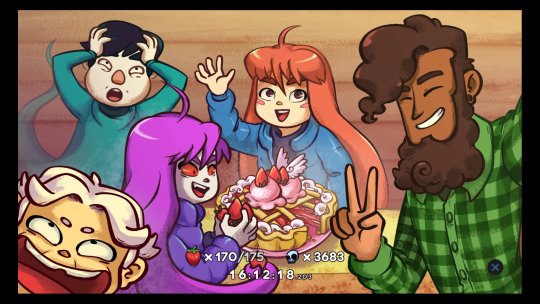
16 hours and 3000 deaths and it was fully worth it.
4. Cuphead

I remember it fairly vividly. A quick cut of indie games for the Xbox One back in 2013 at E3. Just a sizzle reel of the games coming and I saw Cuphead. I believe my exact reaction on Twitter was “HEY WAIT WHAT WAS THAT HOLD ON” or something similar.
As someone passionate about animation history, it stood out strong for all the reasons everyone loved it. The bouncing rubber hose animation (fully hand drawn and digitized), the echoes of Fleischer Studios and extremely early Warner Bros, the intensely jazzy soundtrack full of washed out audio. But what made Cuphead really unique to me was it wasn’t just a tribute to one old form of media.
Sure, of course, the 30s animation style was my big draw, but as more stuff came out about it, I noticed it was essentially just Gunstar Heroes, Treasure’s incredible frantic run and gunner for the Sega Genesis. With that element, Cuphead transformed for me from a game that looks pretty and has a fun concept to a game I knew I would love. And, despite waiting 6 years for it to come out on a platform I could actually play it on, I absolutely did love it.
Unlike Celeste, I did eventually put down the punishingly difficult ode to old school cartoons, but I know its there waiting for me to pick it up again and marvel at every focused enemy encounter and every lushly animated boss fights and stages.
3. What Remains of Edith Finch
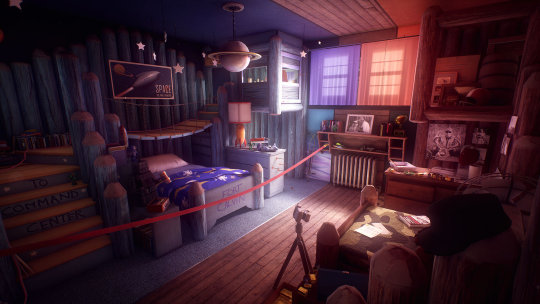
Annapurna Films came out swinging hard in 2017 with their game publishing branch Annapurna Interactive by releasing Unfinished Swan creator Giant Sparrow’s follow up game, a simple “walking simulator” focused on familial lineage.
Edith Finch returns to her old family home located off the coast of Washington. A large estate full of locked doors full of rooms frozen in time, preserved as shrines. You see, the Finches are, in a way, unfortunately cursed, forever plagued with dying in often odd circumstances. As you explore this home and Edith’s narration guides the player. Each room lets you experience a minigame of sorts, a vignette of that very death, told often from the perspective of that very Finch, each one interpreted in its own way.
As morose as that sounds, and there are plenty of sad moments (you play as a damn baby who drowns in a bathtub for crying out loud), its a game who’s whimsy and gallows humor is proudly worn on its sleeve. One story has you playing as a hermit Finch who lives in the home’s basement, desperate to avoid the curse, as you open cans of food over the years. That’s it. That’s the gameplay. And as soon as that Finch feels confident to have survived the curse, he walks out through a hole in his bunker, only to find himself on the railroad tracks with a train approaching.
And in a lot of ways, that’s what Edith Finch is about. Its a game that exists to be about the absurdity and peculiarities of death, what makes it sad, what makes it often funny and how it affects those who love those who have died. Edith Finch is like playing an interactive eulogy to a family that never existed and there are multiple moments that gave me a good laugh and plenty that made me tear up.
2. Undertale

I don’t have anything to say about Undertale. Its an insanely popular video game and for good reason. A story full of heart and a weird sense of humor, a game that subverts traditional RPG mechanics by not only letting you whether to fight or spare your enemies but turns an enemy’s attack into an always cool bullet hell sequence.
Its a game who’s characters are well known, its lines are repeated often, its soundtrack has been turned into memes and is intensely beautiful constantly.
I have nothing to say about Undertale because Undertale speaks for itself. It is an independent underdog game that blasted into the stratosphere of video games. Its good. Play it sometime.
1. Frog Fractions

I wish I could even begin to describe what Frog Fractions is but I can’t begin to express my love for this free weird browser game. Ostensibly a parody of edutainment games, you play as a frog eating bugs to keep them away from fruit and those fruits you collect go toward upgrades. Its fairly simple until, uh... it isn’t.
The ultimate joke of the game is that this fraction game about frogs is barely about frogs and, of course, never about fractions. The only fractions that you actually see are the weird points you gain when eating the bugs. And then that edutainment game becomes a shoot-em-up, which becomes a maze, which becomes a text adventure, then a DDR-like, then it just keeps going on like this until it just suddenly ends. Frog Fractions just kinda never stops until it very quickly does.
What makes Frog Fractions incredible to me is there aren’t many other games that came out this decade that, despite the vast connection between people that now exists with social media and chat platforms like Skype and Discord, elicited such a strong “Hey you gotta check this thing out” reaction as Frog Fraction did in my circle. I remember there being a lot of talk about both not spoiling what happens in it and helping each other try to solve that goddamn text adventure section where you’re fixing a spaceship.
Frog Fractions, for its pure word of mouth weirdness, managed to create enough buzz to even make a sequel, one that came out years after the first one that was slowly revealed with an insane ARG that included hidden images in other indie games (Firewatch included) and eventually launched inside ANOTHER game that you had to dig deep to find. And as fun and weird as Frog Fractions 2, it only has its progenitor to thank for the pure weirdness that it. A game that exists to be “Check this out”, especially in an era of social media, and a game that is just so fantastically bizarre that sends you on a journey through Bug Mars and beyond. That’s the best indie game of the decade.
77 notes
·
View notes
Text
Alrighty, here’s all of my Deltarune theories
1. Deltarune’s central theme\moral question will be something a long the lines of “The free will to do bad things versus the safety of not having the bad choices”. To put it in videogame terms (as Undertale was more concerned with meta-commentary about videogames than real-world implications) “Should a game give you the option to do the evil thing even though you should totally do the good thing?”. The world of Deltarune is... safer than Undertale’s, at least that’s how it looks like. You literally can’t do a Genocide run, you *have* to end your adventure in the Dark World as a ‘Hero’, you have to be good - no matter what you want. It’s safer, since there’s no chance of a Genocide-Timeline, but it’s... oppresively suffocating when you know you have no other option - and kinda creepy to think about the fact that even if you WANT to be a horrible human being, everyone is ignorant to it and thinks you’re a great hero anyway. The world of Deltarune is a world where *nobody* has a choice; the player is railroaded, Kris is controlled against their will, Ralsei argues we *have* to be heroes because of a prophecy, the Darkners were created for a ‘purpose’ so their Free Will might be kinda fucked. The “Pacifist” Ending to the Dark World segment feels like a rushed parody of an Undertale Pacifist Run, complete with going back and talking with all the monsters you befriended. But it feels... deeply unsatisfying because this “Happy Ending” was not caused by your hard choices, but because you just... did as you’re told. Plus, Kris and friends have caused no REAL change in the Dark World the way Frisk changed everything to the Monsters living in the Underground. Sure, there’s a new ruler in Card Kingdom - but the Darkners are still living hidden from Lightners without much hope of having “purpose” again. Meanwhile, in the Light World, the Monsters have lives that... fairly happy and safe - but not quite as happy as they could be in the Undertale True Pacifist Ending. There’s less relationships, less self-improvement, less people-choosing-who-they-want-to-be. No free will robs you of satisfaction and reaching your fullest potential, but on the other hand... is it worth it if it means someone (*eyes the Player*) will use that free will to do evil? Yeah, the Light World is not quite as happy as the True Pacfist Ending - but it is not the only ending Undertale has.
2. There are two main antagonist-forces in the story: The Angel’s Paradise, that force the Delta Warriors are destined to banish and whatever you wanna call the Queen and the Knight and ect. The Angel’s Paradise is responsible for ridding this word of choices, probably for that sort of ‘greater good’ of preventing people from making bad choices (Although, to be thematic, the Angel’s Paradise is also robbed of choice in some way). The Knight and the Queen and company wish to bring choices INTO this world, but like... in a bad way. By destroying and remaking it or something. They would be a metaphor for a frustrated-denied-Genocide-player. But they would also be potrayed sympathetically somewhat because, as mentioned - not having choices sucks.
3. Since the Angel seems to be the center of the religion of Hometown, I think Deltarune will be upping the JPRGness game of Undertale by having Kris literally fight against the God-Figure of their parent’s religion to restore free will to the universe.
4. The Angel’s Religion in the Light World would be very open about the fact that it’s all about personal choices being less important than safety. That’s why Toriel is so religious, valuing safety over freedom was always kinda her thing.
5. I do, at the very least, believe Toby Fox’s claims this is not a direct sequal to Undertale and it doesn’t effect the ending of Undertale that you got in any way. I espacially buy that last part. It’s VERY important to Undertale’s themes that all endings are equally “canon” and whatever one is real depends on the player’s choices and nothing else. I don’t think Toby wants to make either True Pacifist or Genocide or Post-Genocide Pacifist into the “Real Ending”. That hardly means it has to be a totally unrelated AU, however. My money right now is that we’re looking at a stealth prequal. The World of Deltarune is one without choices, by banishing the “Angel’s Paradise” and\or letting the Queen and the Knight destroy and remake the world - they create the world of Undertale, one where there are choices. Although the characters are fearful about existing their safe, railroaded world, they are hopeful this new world would be even better with choices. Although the ending is the “same”, it’s context would be different depending on what you did in Undertale. If you ended with True Pacifist ending, you have proven the hopes the Deltarune people had for the new world correct. If you did a Genocide run, then the Deltarune people just look like dupes and overidealistic fools and you have accidently proven the Angel’s Paradise totally correct about how nobody can be trusted with choices and you’re no better than the Queen whooops.
6. Undertale tells us the original meaning of the Delta Rune symbol has been lost to time. I’m guessing that although the Underground interpeted as a prophecy of freedom - this was all just conjecture and coincidence on their part. The real meaning will be revealed in Delta Rune, it’s probably the Delta Warriors banishing the Angel’s Paradise (IE, the Undertale World’s creation myth, basically). Question is, why is one of the triangles upside down?
7. Not only do I think Sans might be originally from the Deltarune timeline (and aware of it), I think he might be a Darkner. Implications that Sans might not be originally from neither the Underground or the Surface, and that he might not be a proper Monster - are well-documented in the Undertale fandom (”You must really want to go home. Hey, I know the feeling, buddo.” “look. i gave up trying to go back a long time ago. and getting to the surface doesn't really appeal anymore, either.” The fact that he bleeds, can dodge attack and we don’t ACTUALLY see him turn to dust.) I just never took them super-seriously cause none of the purposed “solutions” made sense to me. Sans as a Darkner, though? Darkners are not originally from the Underground, Lancer’s dialouge implies they can bleed, and we don’t know what happens when *they* die. Not to mention, they can perfectly dodge attacks if they’re ‘On Guard’. ALSO, the most consistent difference between Monsters and Darkners? Monsters have Black-and-White dialouge icons, Darkners have them in full-color. But Sans (and Papyrus) have black-and-white faces. Darkners or Monsters, THEIR PROFILES WOULD LOOK THE SAME. That’s the sort of Hidden-in-Plain-Sight twist Toby Fox is into. Papyrus is almost certainly a Monster, he turns to dust when you kill him and everything. So that would mean Papyrus and Sans are not brothers by blood or something like that. Maybe Sans adopted that little Monster Skeleton Child as his “brother” to keep his Lightner disguise intact and ended up really honestly caring for the guy as his true bro.
8. Speaking of Papyrus? Something is very much up with him being one of the only Undertale Monsters you don’t get to meet. I support the speculation that he might have a radically different personality in that timeline, but also... Sans only mentions hanging out with his “Little Brother”, he never mentioned a name. Could it be that Sans’ brother is not Papyrus? At least not yet? I mean, we still don’t know where Gaster fits into this timeline.
9. I’m betting that Deltarune Asriel is... secretly a jerk. Mostly because: A. Ralsei is an obvious Flowey-Analogue and he’s as sweet as they come so what does that makes of the analoge for Flowey’s sweet alterego. B. Everyone is just so fucking praiseful of the guy some other shoe’s gotta drop C. Deltarune has some real ‘Monkey’s Paw’ vibes in regards to what people wanted out of Undertale 2 (Dark World = Just Undertale Again with Some Terms Switched and Upgraded Gameplay, Light World = Hanging Out with the Post-Pacifist Happy Ending Characters) it only make sense Toby Fox would want to fuck with our desire to see Asriel alive by making him such a radically different (and asshole) person. Kris’ gloomy and antisocial personality might be a result of being bullied by their big brother while nobody notices and assumes Asriel is Just Such a Nice Big Bro and Great and Hot. I’d be bitter too. They could have, like, a sequence that plays on our expecations of Asriel from Undertale. Where at first he comes in and seem as nice and sweet as that other Asriel and the player buys into it too (even though Kris was in a position where he would have recognized it as non-sincere) only for it to be NOOOPE he’s a jerk actually! Why did you fall for his trap Kris you’re the one person who knows how he REALLY is it’s almost like you’re mind-controlled or something? Thankfully, since Asriel was last in town, Kris aquired a new mean purple friend who likes eating faces and doesn’t like mean family members.
10. As for the OTHER Goatson, I don’t think Ralsei is like... secretly sinister or deciving Kris and Susie - but I also don’t think his worldview is as sweet and correct and right all the time. His issue is more... naivete, and being just a bit too comfortable with a lack of choice. (He honestly doesn’t seem to realize why Susie isn’t really into “Well, the prophecy says you’re a chosen one so you MUST be a hero and act nice and stuff). Although he means well, I think more will be called into question about his worldview other than the Pacifism. I am also... kinda expecting the twist that he might not be the Prince from the Dark. Again, not because he lied, but because he was... mistaken. (In the Legend of the Deltarune speia tone thing, the Monster and Human clearly look like Susie and Kris - but the Prince of the Dark only looks like Ralsei because he is wearing a cloak, which is not his default outfit. I feel like this might be relevant). He wanted it to be true cause then he’d get to go on an adventure and be a hero and have friends - so he just convinced himself it’s true. Would he be so okay with following prophecies when he finds out that, like, Lancer or whatever is who’s REALLY supposed to be a hero and friends with Susie and Kris?
11. Also that part about Darkners being made with a ‘purpose’, to ‘serve’ the Lightners... it REALLY creeps me out. Ralsei says Lancer feels good inside about being friends with Kris and Susie because he’s ‘fulfilling his purpose’... Is it possible that maybe all Darkners are just... a little too suggestible to friendship from Lightners? Like the friendship with Lancer seems pretty honest, but maybe all the ‘friendships’ we made with the Darkners we spared had less to do with us just being nice and more about us accidently overriding their free will??? Scary to think about, but it fits with the theme of Restrained for the Greater Good versus Free and Evil. It could also explain the King of Spades’ reaction to Lancer saying the Lightners are his friends, as far as the Spade King knew this was more Mind Control than actual friendship. Maybe the Spade King doesn’t think there’s any way to solve that dilemma but destory all the Lightners so that the Darkners won’t have to worry about that ‘purpose’ shit anymore? He thinks it might be the only way his people could have free will? (Also there’s a real theme here about rejecting railroading by becoming a villain; Spade King being a self-professed ‘Bad Guy’, Susie rejecting the role of the Hero to also become a Bad Guy, probably Kris at the end)
12. As for the ‘purpose’ for which Darkners were created. Well, to be meta, I think they were created to be NPCs for RPGames... sorta. I don’t think the game is gonna use the term outright, but they’ll word it like the Darkners were created to play villains and secondary roles in epic-fantasy-stories Lightners made happen inside their realm. That’s why the Dark World follows RPG Logic closer than the Underground (you can sell items in shops, for example), and why all the Darkners are themed after things like Chess and Checkers and Card Games and Plushies. They were made to be playthings, games.
I think that’s it for my predictions to what’s gonna happen next in Deltarune, stay tuned to literally none of them being true in any way.
39 notes
·
View notes
Text
#5yrsago A conversation with Terry Pratchett, author of The Carpet People

Cory Doctorow and the famed author discuss building worlds, the legitimacy of authority, and the future.
Cory: You took a bunch of runs at building a world where a million stories could unfold—The Carpet People, Truckers, and, finally, Discworld. Is Discworld’s near-total untethering from our world the secret of its staying power?
Terry: It isn’t our world, but on the other hand it is very much like our world. Discworld takes something from this world all the time, shows you bits of the familiar world in new light by putting them into Discworld. Is that staying power? You tell me.
Cory: What’s the secret to Discworld’s unplumbable depths, and is there something a big world lacks when compared to one that’s smaller (in more than one way), like the Carpet?
Terry: We know about Earth; we know an awful lot about the solar system. When you do Discworld, you, the writer, can more or less change anything if you want to, if you can make it fit. It means you’re god, and that’s a great responsibility.
As a writer, you can take bits of the universe and put it in your own new universe. Working in Discworld, you use the word sandwich, and you think: Can I do this? Now I’ve got to have a reason why a sandwich is a sandwich—in our world, it was named after the man associated with its invention, the Earl of Sandwich. Can you have your own universe and still have sandwiches? You have to do it all yourself and decide if you need to open the door into our reality at the same time.
Once Discworld started moving, as it were, it started moving almost of its own volition, because I would write a Discworld novel, and that novel required that such and such should be available, or whatever, and that means that the next time, that’s real in Discworld and the thing grows. And I must say it grows to be rather bigger than a carpet—but with care, it can have just about anything in it.
I’m finishing up Raising Steam, in which the railroad comes to Ankh-Morpork, and an awful lot of things have to be made and discovered until you get to the top of that pyramid. You can’t have Vaseline until someone’s invented something else. You have to create and understand a lot of things before you can move on. And so, since I work on Discworld almost all the time, it grows because I need it to.
Cory: Do you think that there’s any way you could have kept us in the Carpet for anything like the number of books that we’ve gotten from Discworld?
Terry: I was about to say “No,” but right now I wonder. . . . If the idea had taken, I don’t know. I really don’t. But how would it be? It would be almost a kind of . . . People in the Carpet are more or less tribal. What would happen if I . . . You’ve got me thinking!
Cory: Contrariwise, I feel like Dodger could have been the start of its own saga, about any number of characters from Dickensian England—do you think the world of Seven Dials has enough material to fuel a Pratchett engine through quite so many books?
Terry: The answer is yes. Because it’s all there. The people Dodger meets are real, the places he goes are real, and all I have to do is put in that little touch of fantasy, i.e., Dodger himself. Queen Victoria was real, though it’s hard to believe—and she’s free; you don’t have to pay to use her. There’s a whole lot of people that Dodger could have met. I’m pretty certain he’s going to meet Darwin or his grandfather (more likely) at some point.
If I run with it, no limitations, I could keep it going, I think. I know a lot of the stuff. I know how they talk, I know the history. It doesn’t really matter if I put a bit of fantasy in to make the pie rise. You can go into the world of “What if?”
Cory: So much of your work is about the legitimacy of authority. You write a lot of feudal scenarios, but you also seem like a fellow with a lot of sympathy for (and suspicion of!) majority rule. The witches gain authority through cunning and compassion (Nanny Ogg), through knowledge and force of will (Granny Weatherwax). Kings rule by divine right and compassion for the land; Vetenari, out of the practical fact of his ability to control the city’s factions. The Carpet People is shot through with themes of who should rule and why. Where does legitimate authority spring from?
Terry: The people! The only trouble is the people can be a bit stupid—I know that; I’m one of the people, and I’m quite stupid.
Lord Vetinari is that wonderful thing: a sensible ruler—that’s why he’s so popular. Everyone grumbles about him, but no one wants to chance what it would be like if he wasn’t there. I like Vetinari. I don’t mind authority, but not authoritarian authority. After all, the bus driver is allowed to be the boss of the bus. But if he’s bad at driving, he’s not going to be a bus driver anymore.
Now, an interesting sideline on this is the question of the writer’s position is vis-à-vis authority.
A journalist looks at authority as a target as a matter of course. You don’t actually have to fire, but you see it as a target. Since I am tainted as a journalist, I can’t separate that out from being a novelist, and my personal view is that you look askance (at the least) at authority. Authority must be challenged at every step. You challenge authority all the time to keep it on its toes. Vetinari works because there aren’t enough people who think he’s doing a bad job; they’re all factions, in any case. So he balances the world. It’s not everyone being happy, but rather not too many of them being unhappy.
Now you, Cory, seem like a fellow with a lot to say about authority yourself. Where would you say legitimate authority springs from?
Cory: This is a question I’ve put a lot of thought into as well. I think that just authority arises from systems that fail gracefully. That is to say, the important thing isn’t what happens when the ruler does something that you agree with—the important bit is what happens when she does something stupid and terrible.
I am far more interested in graceful failure than blazing success. If you select a leader by a means that contains robust oversight, a meaningful recall mechanism, and recourse to alternatives (an independent judiciary, say) in the event of substantial wrongdoing, the authority is legitimate, because if things were going badly off the rails, you could replace her.
This is something that worries me about Lord Vetenari. He is, like all of us, imperfect. Lacking any checks on his authority (apart from civic uprising), he is likely to fail badly, even though he succeeds brilliantly.
All that said (and to your question below): the *reason* to have authority is to simplify the task of getting on together. But technology lowers coordination costs and so undermines the case for governance in some instances. I generally refuse to predict the future (on the grounds that SF writers who dabble in futurism are like drug dealers who sample the product—unlikely to come to a good end). But when pressed, I say, “To imagine the future, imagine the cost of coordination trending towards zero in more and more domains. Now we make encyclopedias and operating systems the way we used to organise bake sales. What if we could build skyscrapers that way? Airplanes? Air traffic control systems?
The Carpet People concerns itself with many questions of infrastructure and public works—another theme that has featured in many of the most enjoyable Discworld novels, especially Going Postal/Making Money. Ultimately, it comes down to the builders, the wreckers, and the free spirits. Now that we’ve arrived at a time of deep austerity, what do you think the future of infrastructure is?
Terry: To crack and fall away, I sometimes think. From what I see around me, it’s people doing it for themselves. We know the government is there, but we know they have no real power to do anything but mess things up, so you do workarounds.
On the matter of builders, wreckers, and free spirits, I’d say that Tiffany Aching [beginning with The Wee Free Men] is a builder. Moist von Lipwig [beginning with Going Postal] is a free spirit, but also a builder—I think people can go in and out of sequence. My dad was a mechanic; maybe my interest in builders starts there. You made your own catapult. You made your own crystal receiver. He encouraged in me that kind of thing. Even if it was dangerous, he took the view that I ought to be clever enough to know what I was doing.
My parents were practical people. That’s the word that is missing here: practical about just about everything. The ground state of being of practicality. Sometimes things need tearing down—and that might be, as it were, the gates of the city. But if we talk without metaphors, I would say that building is best. Because it is inherently useful.
And you, Cory? Do you want to make the case for wreckers?
Cory: Never wrecking for its own sake. But disruption, yes, I’ll make that case. There is no virtue in the fact that all of us use toilets, but only some of us clean them. If we invented a machine tomorrow that obviated toilet scrubbing, that would be an unalloyed good, even though it also obviated the work of toilet scrubbers.
That isn’t to say that a just or caring society should cast aside the toilet scrubbers. The Luddite fight is miscast as a fight against technology, but it’s not—the Luddites smashed looms over a difference of how to apportion the dividends from automation, not because they objected to automation itself.
Kevin Kelly has a marvellous “robotics curve” that goes:
1) A robot/computer cannot possibly do what I do. 2) OK, it can do a lot, but it can’t do everything I do. 3) OK, it can do everything I do, except it needs me when it breaks down, which is often. 4) OK, it operates without failure, but I need to train it for new tasks. 5) Whew, that was a job that no human was meant to do, but what about me? 6) My new job is more fun and pays more now that robots/computers are doing my old job. 7) I am so glad a robot cannot possibly do what I do.
I’m not so sure about #6: we seem to be perfecting a system that only provides a living to financiers who invest in robots. This won’t work (if the bankers have all the money, no one can buy the things the robots make). We need a system that distributes automation’s dividends or we’ll end up with nothing at all.
One thing I’ve always enjoyed about your books with feudal settings is that it seems you get something like the correct ratio of vassals to lords. I always get a sense that for every ermine-trimmed guild boss in Ankh-Morpork, there are a thousand potato farmers in a shack in a field somewhere. So much of fantasy seems very top-heavy—too many knights, not enough serfs. Do you consciously think about political and economic considerations when you’re devising a world?
Terry: I’ve never been at home with lords and ladies, kings, and rubbish like that, because it’s not so much fun. Take a protagonist from the bottom of the heap, and in the same way it’s good to have a female protagonist, as she’s got it all to play for. Whereas people in high places, all they can do is, well . . . I don’t know, actually: I’ve never been that high. If you have the underdog in front of you, that means you’re going to have fun, because what the underdog is going to want to do is be the upper dog or be no dog at all. And I’ve never felt the need to have lords and ladies as my champions, as it were.
In Ankh-Morpork there are notables, some of whom are stupid, and some of whom are useful and likeable, but it’s a mercantile place. It’s money that matters. And where do I get that from . . . ?
Cory: Damon Knight once told me that he thought that no matter how good a writer you are, you probably won’t have anything much to say until you’re about twenty-six (I was twenty at the time and he was my writing teacher, at Clarion—ouch!). You’ve written about collaborating with your younger self for the reissue of The Carpet People. Do you feel like seventeen-year-old Terry had much to say?
Terry: That’s the best question you’ve asked all day!
I think the he had a go, and it wasn’t bad. And then he was clever enough to read a hell of a lot of books and every bound volume of Punch. But when I was younger, I didn’t have the anger. I think you have to have the anger. It gives an outlook. And a place from which to stand. When you get out of the teens, well out of the teens, you begin to have some kind of understanding, you’ve met so many people, heard so many things, all the bits that growing up means. And out of that lot comes wisdom—it might not be very good wisdom to start with, but it will be a certain kind of wisdom. It leads to better books.
The Tiffany Aching series is what I would most like to be remembered for, and I couldn’t have written Tiffany Aching when I was seventeen. I just wouldn’t have had the tools.
But the question remains: As a writer of fantasy, can I be a proper writer? I don’t do literature, I do writing—you get paid for writing, for literature you just get plaques to put on the wall. I never really bother about it. I don’t think anyone in the genre does. It doesn’t really matter; it’s what you’re doing: you’re working. Writing happens; it’s what I do. I’m here; I do it. I like doing it. I like getting paid for it. I like the fun.
Being an author is not as much a job: it’s a life.
Thank you, Cory. It’s been fun.
Cory: “Being an author is not as much a job: it’s a life.”
Preach, brother!
It’s been fun for me, too. You certainly have your share of plaques on the wall and a richly deserved sword made of genuine sky-metal, but as a reader of your works, the thing that matters most to me is the books, for which I am heartily grateful.




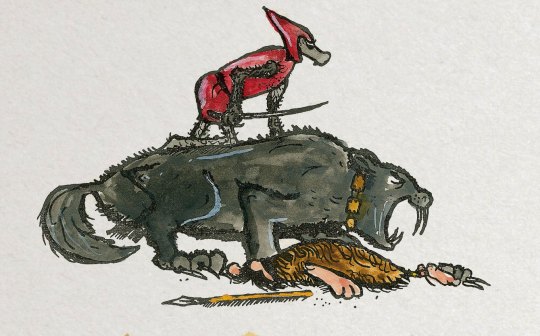
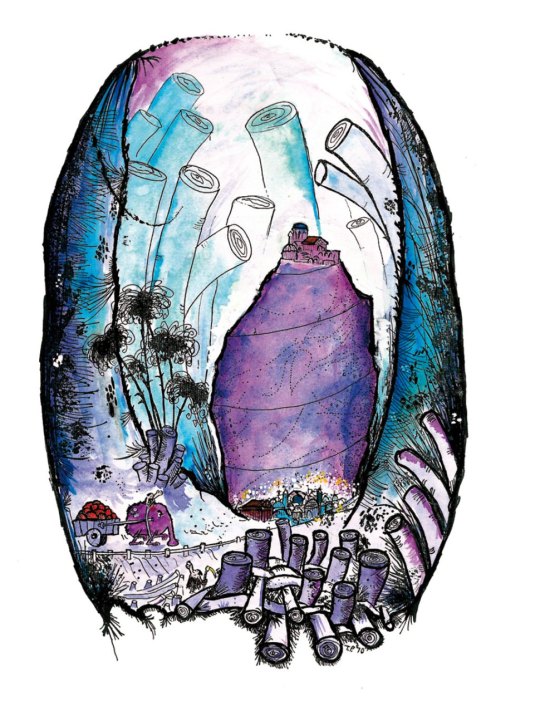

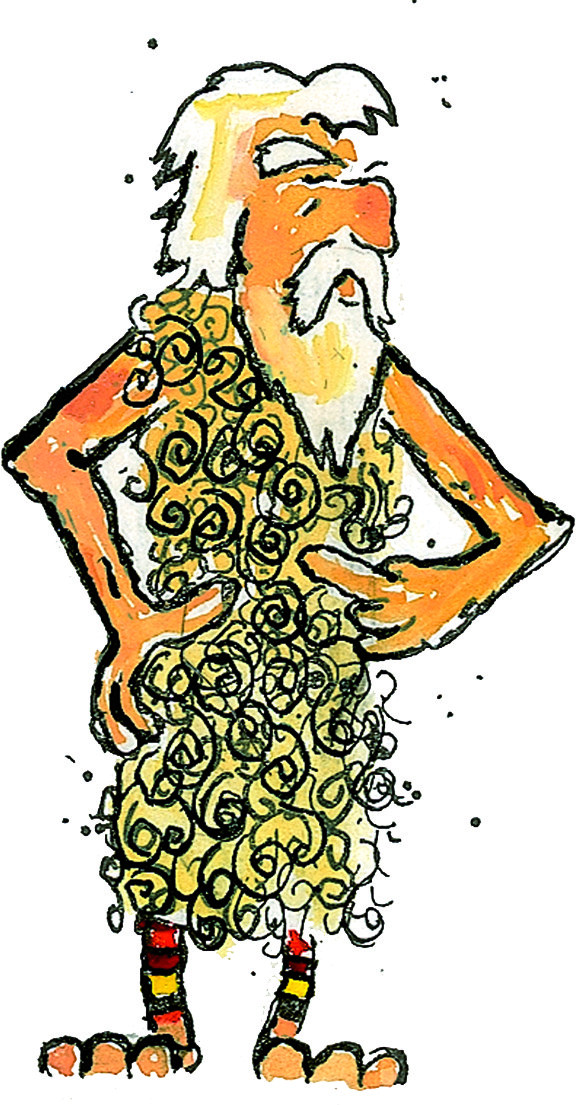
https://boingboing.net/2013/11/05/a-conversation-with-terry-prat.html
22 notes
·
View notes
Text
AU Thursday: Tell Me Where To Find Shelter -- The Reboot
Okay, so -- this past Saturday, I brought back the Pentatonix/Lindsey Stirling cover of Imagine Dragon’s “Radioactive,” and commented that part of the reason the song was on my mind was because I’ve been really getting into Fallout 4, which I’m playing with Victor as my Sole Survivor. This mean that, of course, I have a Valice AU for the game -- “Tell Me Where To Find Shelter.” I originally came up with a rather simplistic version of the AU aaaalll the way back in 2016, based on what little I knew about the game (and the series in general) from getting into the Fallout Shelter mobile game and seeing a friend’s posts about her Sole Survivor. That original version could be summed up as basically “the prologue sequence, only Victor and Victoria are secretly in a poly relationship with Emily, who dies too when their kid is stolen, and Victor discovers Alice alive in the Vault as the only other one who made it -- they go out into the Wasteland together to discover what happened to Victor’s kid.” Pretty simple, right?
Yeah, you can throw all that out. Now, I have actually played the game, spoiled myself on the main quest and a lot of the side quests because I don’t give a damn, and have done a bit of research on the history of the Fallout verse as a whole. (Short version: It sucks. It sucks a lot.) So I have a lot of new ideas, meaning it’s time to reboot this verse! I wouldn’t expect a full-fledged story to come out of this (you’ve seen me panicking over the size of “Londerland Bloodlines,” right? Which is based off an action RPG that is reasonably linear and has a timeline of a month? Fallout 4 is open world and while the main quest is linear, the fact that I’ve been able to ignore it for MONTHS in-game because I can’t say no to Preston Garvey is -- eeep), but I may at least do a few snippets and whatnot.
So! Let me share what I’ve got regarding Victor’s history as the Sole Survivor of Vault 111 -- I’m gonna try to keep it to more general thoughts as I’m not totally up on the history of the Fallout world, and things may have to be adjusted if I later discover that something in the canon strongly contradicts it:
-->I have got his birth date: June 9th, 2050. This makes him 27 at the start of Fallout 4, which I felt was reasonable based on the Fallout Wiki stating both Sole Survivors were likely born between the early 2040s and the mid 2050s.
-->I still want him to be born in England, and have his family move to America a little later in his life -- though when is complicated by the whole Euro-Middle Eastern War and the New Plague putting America under quarantine for a while. The latest I can imagine is them making it over in his early teens or so, having left the broken-down wreck of the U.K. to rebuild fortunes in America.
-->They do indeed rebuild fortunes in America -- Boston, Massachusetts, to be precise. William sets up an extremely lucrative fish-canning business and makes sure to support the military extensively. (The Four Leaf fishpacking plant is almost certainly one of his in this timeline.)
-->The Victor/Victoria/Emily poly thing still happens, kicked off by Victor’s parents pressuring him into dating Victoria (whom he likes), Victor making friends with Emily (whom he also likes) -- and Victor accidentally asking Emily to prom via trying to rehearse his lines to ask Victoria to prom. Feeling bad as Emily is coming off a really bad breakup with an ass named Barkis (who stole a lot of money from her in a long con), he clears it with both girls to take Emily, and later they help defend Victoria when Barkis returns during the party and try to rob her. This leads to a close friendship, which eventually becomes something more.
-->Victor ends up being pulled into the Sino-American war straight out of high school -- William attempts to buy his way out, but for once his money doesn’t work, and Victor ends up fighting in Anchorage, Alaska.
-->This version of Victor, while still into butterflies and moths, is also a tinkerer, and quickly becomes known among his fellow soldiers in Fox Company (108th Infantry Regiment, 2nd Battalion) as “that guy who can fix anything with duct tape and Wonderglue.” (I do enjoy my armor and gun mods -- everything must be deep pocketed!)
-->I’m not sure what Victor does to earn his “decorated war hero” status yet (probably saved the lives of a lot of men with some quick repairs and shooting), but it’s enough to finally get him discharged around 2076. Victoria and Emily had gotten together while he was stuck fighting, but are only too happy to let him into their relationship. Victor officially marries Victoria to keep his parents happy, and they move into Sanctuary Hills with Emily pretending to be their “eventual live-in babysitter” to avoid scrutiny from the parents.
-->And then, during a park escapade, Victoria ends up pregnant. Baby Shaun is welcomed to the world July 31st, 2077. Everyone is thrilled, and Victor picks up a Mr. Handy soon afterward to help with baby care.
-->And then, of course, the bombs drop on October 23rd, 2077. Victor, Victoria, Emily, and Shaun just barely make it into Vault 111, and end up in cryonic suspension -- Victoria is later shot when her and Victor’s pods are reactivated during the kidnapping, and Emily dies quietly when the life support is cut to all but Victor’s pod. Victor is absolutely devastated by their deaths, and takes Victoria’s wedding ring and Emily’s favorite butterfly hair clip as mementos to remember them by before leaving Vault 111.
-->As for the actual game stuff:
Victor’s starting SPECIAL stats were Strength 4, Perception 3, Endurance 7, Charisma 2, Intelligence 8, Agility 3, Luck 3. I’ve been mainly improving Strength for carry weight, though I recently started working seriously on bumping up Charisma because I have realized making it a dump stat was probably not the greatest idea.
I can’t list all his current perks off the top of my head, but Armorer and Gun Nut are up there -- he’s very much a shooty-bang-bang kind of guy, and I believe I mentioned loving deep pockets?
Victor hasn’t met all the factions yet, but -- he’s definitely a Minuteman. I am so easily distracted by those quests, it’s not even funny. ...Well, it’s a little funny. XD He was only too happy to help Preston Garvey’s group set up in Sanctuary Hills, and he and Preston are best friends now -- aka, Preston’s the first companion who idolizes me and whose perk I got. He’s a LITTLE awkward about the whole “General” thing (”Preston, you’re the one always telling ME what to do”) but he’ll grow into it.
As for the other factions -- he’s met Paladin Danse and helped him out at Arcjet, but refused the offer to join the Brotherhood. . .he might go back and do some missions with them, but I don’t think he’s going to like Elder Maxson’s views on synths and ghouls (Super Mutants -- okay, Super Mutants are assholes). He hasn’t met the Railroad yet, but I think he’ll like them and join up to help, even if he thinks some of their methods need tweaking. The Institute -- I think he’ll be of the mind that their discoveries are good, but they’re using them for such evil purposes, and -- ugh.
That being said, I’d like to go for the Minutemen ending that does not require warring with the Brotherhood of Steel, simply because there are kids on that airship and I’d feel bad shooting it down. If there was a way to just get rid of Maxson and maybe yank the Brotherhood closer to its Fallout 3 views. . .and if not blowing up the Institute was an option, Victor would be for it. Getting rid of the top brass who have completely written off the Commonwealth is one thing -- but the building, with all its advances? That could be useful.
Oh, and yes, he is adopting Synth Shaun -- but he is letting the kid know who and what he is, to help him forge his own path in life. (Synth Shaun also correctly guesses his new Dad feels awkward calling him by his predecessor’s name, and they decide on “Chester” instead.)
As for companions he’s currently met -- mentioned already that Preston’s his best friend, and he’s a solid supporter of the Minutemen. He adores Dogmeat and has made him a doghouse to live in at the Red Rocket near Sanctuary. He likes Piper Wright and her desire to spread the news quite a lot (and finds her attractive too). Danse he admires for his commitment to his men and his cause, but doesn’t really know him beyond that due to not joining the BoS. He IS very thankful for the gun, though -- Righteous Authority is useful! Codsworth and he had some rough moments at the beginning (I gave Mama Murphy some Jet for a vision, and poor guy got in the way of some friendly fire on an early trip), but seeing Victor get his modding on has improved their relationship quite a bit (Codsworth sees it as Victor getting back to his old helpful self). He’s encountered Ada and has grown quite fond of the little robot, wanting to help her avenge her slaughtered caravan family (WHY CAN I NOT HUG THE ROBOT). And he’s rescued Strong from Trinity Tower. . .and ended up getting sick of the Super Mutant’s constant negative comments toward humanity and inability to figure out stealth. He was helpful in taking back The Castle, but currently Victor’s got him living with a couple of settlers as a “guard” of sorts, in the hopes it’ll keep him busy and out of Victor’s hair.
And now you may notice there’s a strange lack in this longer-than-I-anticipated write-up. . .namely, where the hell is Alice? Well, that question has three answers:
-->For the purposes of my playthrough, I’m designating Piper as Alice -- she’s going to be Victor’s romance option in this game. (Me turning my attention to boosting Charisma may have been inspired by being unable to flirt with her during an affinity conversation no matter how many times I reloaded.)
-->An idea I had recently to put Alice in the verse was have her as a native-born Wastelander/escapee from a Vault (latter would probably be best to keep her history -- oh cripes, maybe she was from a Vault where BUMBY was OVERSEER, imagine THAT horror) who discovers the history of the “Order of Mysteries” (a group of women, lead by the old voice actress of the Mistress of Mysteries, who turned herself into a legit superhero post-Great War -- unfortunately betrayal led to the group dying out) and decides to take up the mantle, much like the Sole Survivor can become the Silver Shroud. She’d show up not long after Victor starts Shrouding around, asking to meet -- they’d have a little spar, end up fighting another enemy together, and she’d join up as a companion, leading to eventual romance.
-->But the first idea I had to get Alice into the story was. . .well. . .
Let me put it this way -- for quite a while, I was playing both Vampire: the Masquerade -- Bloodlines and Fallout 4 at the same time.
. . .yeah, I think this is going to need another post.
#tell me where to find shelter#fallout 4#victor van dort#in which I ramble on a lot about an AU that really only lives in my head#so what else is new XD#yeah I was originally going to have the Van Dorts come to America when Victor was 15#then I thought 'maybe that's too late'#looked at the timing of the Euro-Middle Eastern War#'okay maybe they leave when he's pretty young to get away from THAT mess'#and then I discovered the timing of the New Plague#'I'm not giving him up as English-born Fallout YOU CAN'T MAKE ME'#so yeah now that's happily vague#but he's in Boston and naturalized by the time he ends up in the Army#also can you tell what companion I like the least?#Strong I had high hopes for you#but then you WOULDN'T SHUT UP about Super Mutants killing everything#pathetically he admires me because I took him around killing lots of stuff while exploring the Commonwealth#also why is there no option to comfort Ada when she talks about her loss#I tried to and I got options like Disable Personality#no game fuck you#let me hug the robot#I have Feelings about this game now can you tell?#queued
0 notes
Text
MORRISON: FALL 1997 / YOSEMITE: JULY 21 – 25, 2001
One night when I was sixteen, I was up in my bedroom watching Pulp Fiction for about the twelfth time, and I was up to the second-to-last sequence—the seventh sequence, which is actually the third sequence if you were to put the whole thing in chronological order (which it most certainly is not).1 The seventh sequence is the sequence after Jules and Vincent have left the apartment where they got the briefcase and Jules quoted that long passage from Ezekiel 25:17, and they killed the two young men (Roger and Brett) and were talking to the third young man (Marvin) when an unknown fourth young man came charging into the room and unloaded a round but somehow managed to miss both of them. Jules was convinced that it was divine intervention. Then, in the seventh sequence, they are in the car with Marvin in the backseat, and they are arguing about the matter (“...this shit doesn’t just happen!” says Jules) when Vincent turns to get Marvin’s opinion on the whole thing and accidentally shoots him in the face. “Oh man, I shot Marvin in the face.” I was laughing out loud at that whole scene when Mom called up the stairs with a tone of voice that I hadn’t heard for years.
“Danny,” she called. “Danny, come downstairs. We need to talk to you about something.” I had just taken a hit from my little chrome one hitter, exhaling the smoke through a small cardboard toilet paper roll stuffed with dryer sheets and out the open window. A train rolled by outside, rattling by on the tracks just beyond our yard, headed west out over the Mississippi River, through the noxious river town of Clinton, and out into the cornfields of Iowa and beyond.2
“Be down in a minute!” I yelled over the racket.
I turned off Pulp Fiction and fished through the pockets of my flannel jacket for my Visine. I put drops into my eyes, then pushed through the blankets I had nailed up over my door, and walked out, through Adam’s room, scattered with action figures—my old G.I. Joes and muscle-bound He-Man figures, and also some new ones I didn’t recognize. In the tiny upstairs bathroom I changed my t-shirt, washed my hands, and splashed some water on my face. Then I walked back through Adam’s room and plodded downstairs.
The steep and narrow back stairway in that drafty old house dumped you out into the wood-floored dining room, with its flowery wallpaper, large table and chairs, a cheap glass chandelier hanging from the ceiling, and the chest of drawers that Mom called a “buffet,” which was always decorated with some doilies and decorative plates with strangely vague Biblical quotes on them. To your left were the kitchen and, beyond it, the backyard and freedom. To your right was the living room. I reluctantly turned right.
Don and Mom were seated on the floor in the lamplight, leaning back against the couch and facing the recliner in the corner. They never sat on the floor. This was serious. Like they were finally going to call me out for being high all the time. Or maybe one of the grandmas died.
Mom smiled warmly and motioned for me to sit in the recliner in the corner, then put her hand on Don’s leg and looked lovingly at him. The old man looked like he was about to squirm right out of his khakis.
“What’s this all about?” I asked.
“Danny, we love you so very much and we’re so proud of you,” Mom began.
“Jesus, Mom,” I said, chuckling nervously. I shifted in the recliner—folded my right leg and sat on it. Then she looked me dead in the eyes.
“I was in love with Don before I was divorced from Jack,” she said.
I looked right at Don, who was looking awkwardly, silently, at a spot on the carpet. And of all the things I could have said right then, I think I said: “Holy shit.”
But I don’t remember, really. I may have said something else entirely. Mom was going on nervously about how Don was my real father. About how I, and not Adam, was their first offspring. Like I hadn’t understood that immediately. I took it all in. Then, instead of asking a hundred questions like I should have, I started giving orders.3
“Well, everyone has to know,” I said. “We aren’t a family that keeps secrets from each other.”4
“Of course,” Mom said.
“Who does know?”
“No one.”
“No one?!”
“No.”
“Well, everyone needs to know.”
“We can call your brother and sister now. And we can call Jack.”
“Wait, DAD doesn’t even know?!”
“No.”
“He still thinks he’s my biological father?!”
“Yes.”
“But I’ve been calling him DAD for SIXTEEN YEARS!”
“We know, Danny. We know this is tough.”
“Jesus fucking CHRIST!”
“Alright now...”
“I’m sorry, but HOLY FUCKING SHIT!” I yelled. I laughed at my own awkwardness—at everything, really. I laughed quickly, nervously. Then I calmed myself. I took a few deep breaths and forced a smile. “You know I love you guys, but I’m probably not going to change my name. At least not for a while. I’ve been a Duffy my whole life.”
“We understand,” Mom said.
“Of course,” Don said. He cleared his throat.
“I’m also probably going to keep calling Jack ‘Dad’ and you ‘Don,’” I added. “You know, just out of habit.” Don and Mom smiled and nodded. Mom had tears in her eyes. Don just looked...I’m not really sure. But he looked up at me. And I could see it. I could see the similarities in our faces, in the way we carried ourselves. Even in the way that he was sitting there—his shoulders slightly slouched, his hands folded on his lap, his legs out in front of him, the right crossed over the left at the knees. His big, flat feet. His black socks that always had holes in them.
I would think of this very moment almost four years later, on Don’s fiftieth birthday, when Mom bought him a plane ticket to come out to Yosemite and visit me for a few days. That was right around the time that Marcus and I first got the job at Yosemite View Lodge in El Portal. I suppose I should have mentioned it earlier, when I was talking about that job, and Marcus, and Chloe and my desire to get that paycheck and get the hell out of there—but I wasn’t really thinking about it then, to be honest. So I’m going to tell you about it right now:
Mom had called the Yosemite View Lodge one day while I was at the front desk. Marcus answered, and I heard his voice change immediately into that sort of innocent and cute voice that people use when talking to their friends’ parents. Then he looked at me and got this shit-eating grin on his face and I just knew it was Mom on the other end.
“Give me the phone, asshole,” I had said.
Mom went into apologetic mode instantly, so I knew something was up.
“Danny, I’m so sorry I’m springing this on you now, but I’ve been trying to get a hold of you for so long! It’s hard, you being out there in the middle of nowhere. But the reason I’m calling is that your father’s birthday is in a couple of weeks...”
“I know, Mom,” I said. Mom was always reminding my siblings and I about birthdays, and it drove me crazy. She still reminds us today, which is hilarious, because we’re all grown adults who have somehow managed to miraculously learn how to use a goddamned calendar. “I was already planning on calling him.”
“Well, you’re not going to have to call him,” she said, “because I bought him a ticket to come out there and visit you!”
Now, this was obviously my mother trying to give my father an excellent fiftieth birthday gift while also—and most importantly—setting up a perfect setting for some serious father-son bonding. Don and I had thrown around a baseball maybe twice, and we shot hoops together a few times in those beautiful Illinois summer evenings, when Don had just walked home from the hardware store over the railroad tracks and through the neighbors’ back yards, and I was out in the driveway working on my free throws, because I really was a terrible free throw shooter.5 And we also had that one weekend when Mom was on some church retreat and we watched The Good, The Bad, and the Ugly and made big steaks for dinner two nights in a row. And I worked for him at Morrison Hardware for a while, but there was very little bonding time at the store. So I guess what I’m saying is that I’m not complaining—that’s some quality bonding right there. That’s more father-son bonding time than a lot of kids get in their weird little kid lives. But the fact was that I still called Don “Don,” and—though I knew he was a good man and a more than capable guardian who was great for Mom and our family—I had never really thought of him as my true blood father or treated him as such. And Mom knew that and was trying to change it. She was trying to put Don and his first-born son in a pristine setting and a situation where, even if we didn’t talk—as we rarely did—we would nevertheless have no choice but to share some serious “moments” together. Some real man moments. Like in the made-for-TV movies, or whatever.
So I obviously didn’t tell Mom that I wasn’t getting paid for another couple of weeks and that I was flat broke and hitchhiking to work every morning because my car had no gas. And I didn’t tell her that I had no place to live, and was either sleeping by the river, or in Chloe’s bed or on John’s floor every night. I didn’t tell her anything about being caught stealing and losing my job in the valley, or hitchhiking to San Francisco, or having visions on Mount Dana, or losing my mind about loving Chloe but wanting to leave everything and just wander the country alone forever. Instead of saying anything about any of that, I said, “Aw, Mom, that’s a great idea! I’ll get us a room here at the lodge.”
“Oh, that’d be just great!” she said, in her cheery and sentimental Mom way. Then she went on and on about all the details, and about how I’d have to pick him up at the airport in Merced, and I wrote some stuff down but I was really just thinking about how I was going to have to borrow money from Chloe to put gas in the Olds. Then I heard her say, “How’s Chloe?” and I snapped out of my little panic attack long enough to make up something about getting busy and having to go back to work and thank you so much for calling and I love you and this is going to be fun, etcetera, etcetera.
Two weeks later, on the afternoon of July 20, Don came to Yosemite. I picked him up in Merced and we drove east on the 140 through that rolling golden prairie that stretches from the valley to the foothills. I could have taken the 140 straight to El Portal and the Yosemite View Lodge and we would have been there in an hour. But I really wanted Don to see Yosemite Valley before sundown—and he really wanted to see it, as well—and I wanted so badly to take him past all the grand vistas offered by the southern entrance of the park that we ended up driving about an hour out of our way. So we shot northeast up the 140 into the foothills, then turned southeast on the 49, down through sleepy Oakhurst, and then straight north up Wawona Road and into the park.6
Because of our detour, we got into Yosemite Valley as the sun was setting. Don met John and Marcus and a bunch of other park employees, and he met sweet, sweet Chloe. Don loved the hell out of Chloe, who immediately opened up to him and started telling him about the hike we were all going to take together the following day. He looked at and talked to John and Marcus and everyone else like they were a bunch of circus freaks (which, admittedly, we all kind of were). Don, Chloe and I went to Yosemite Village for pizza and a few beers, then I drove Don out to Yosemite View Lodge where we checked in and passed out.
The following morning, we woke with the sunrise and drove through the freezing cold crystal blue alpine air back to Yosemite Valley, where we picked up Chloe, loaded up our packs with all of our camping gear, bought some coffee, then drove out of the valley up to the high country and Tuolumne Meadows. After a quick breakfast at the Tuolumne Meadows Lodge, we shouldered our packs and spent the rest of the day hiking to Vogelsang—a twelve-mile hike up the pristine and alien alpine landscape of Lyell Canyon. We all hiked apart from one another, with Chloe way out in front, Don in the middle, and myself taking up the rear, and Don had it pretty rough. He was enjoying the hell out of all the views and everything, but Chloe and I hadn’t accounted for the fact that he would need some time to adjust to the altitude, and he ended up being sick for most of the day. The trail barely climbs 200 feet in the first six miles and follows a stream with crystal clear water the whole way, and he was fine through all that, but then we reached the six mile junction, when the trail climbs 2,000 feet in a mere three miles. By the time we got to Vogelsang and set up the tent that evening, he looked like a dead man walking. Chloe and I fed him some potato soup and hummus with crackers, and he made some kind of comment about how we ate like squirrels, then threw up his dinner and was passed out in the tent we set up for him, face down in his sleeping bag, before sundown.
The next day, I started to see Don a bit differently than I ever had before. He woke up before Chloe and I, and when I rolled over in my dew-dampened sleeping bag and looked at him across the bright green alpine grass, sitting outside his tent on a rock, staring into the slowly brightening blue sky, he looked young and fresh-faced, even a little naïve, as he had probably looked some thirty years before. He also looked like a man alone. But he looked resolute in his loneliness. He looked like a man who had not had the pleasure of waking up alone in a long time, and was determined to enjoy that experience for all it was worth.
Chloe woke up shortly after I did, and we made some coffee on the camp stove and ate some granola for breakfast, then started the long hike back to Tuolumne Meadows. I hiked with Don the whole way, and we made some small talk, but mostly just walked in silence and enjoyed each other’s company. Don also took some pictures of me that he gave me later, and they are some of the best pictures that anyone has ever taken of me, even though in every single one of them I am walking away.
The following day we took it pretty easy and bummed around the valley for a while, then drove down to the Mariposa Grove of Giant Sequoias to walk among the trees. I told Don had to work the following two days—I really needed the money—and he was okay with it, but was so amped up about having made it to Vogelsang and back that he was determined to keep going—to do another big hike, and yet another one the following day, which would be his last full day in the park. Chloe had another day off and offered to take him up Half Dome the following day, so the two of them went for it and not only did it, but did it well—hiking all the way up, summiting the mountain with the hordes of other tourists, and hiking all the way back to the valley in the time it took me to work one eight hour shift at the lodge desk. We celebrated their feat with more pizza and beers, and then I took Don back out to the lodge for a much-needed soak in the hot tub and a good night’s sleep.
I figured that Don would take his final day in the park easy—maybe hang out with me at the lodge for a bit, then do some touristy things in Yosemite Valley—watch a movie in Yosemite Village, hike to the base of Lower Yosemite Falls, wander through the cemetery, watch a John Muir lookalike give a lecture in the Curry Village Amphitheater—but he was surprisingly up and gone before I even managed to get myself out of bed and over to the front desk to start work. He left me a note that he had taken the Olds into the valley to do another hike.
Eight hours later, my shift was done and Marcus and I walked up to the room to see if Don had returned and to ask him about his day, but he was still gone. Nothing about the room was any different from how I had left it that morning.
“I’m sure he’s on his way back,” I said.
Marcus’s answer was typical: “Well, come smoke a blunt with me, then.”
We walked down to the river behind the lodge and sat on the rocks to smoke while we watched the sky change colors with the sunset. Then Marcus went out to the highway to hitch a ride back to Yosemite Valley, and I went back up to the room and fell asleep on the bed in my work clothes.
I was awakened to the sound of the room’s door closing. It was dark, and I looked at the clock on the desk by the television. It was midnight, and there, standing before me, wide-eyed and delirious, was Don. He was covered in dirt up to his knees and had smears of dust across his sunburnt face, and his white polo shirt was stained with sweat.
“Where are you coming from?” I asked.
He threw down his keys and wallet, took of his belt, and tossed an empty water bottle into the garbage can in the corner. Then he sat on the bed with a grunt and began wrestling with his tennis shoes. “Weren’t you worried about me?” he asked. He pulled one of the shoes off and a cloud of dust went into the air. He waved at the cloud, then looked at me. “Did you call anyone? Ask anyone where I might have gone?”
Quite frankly, I hadn’t even thought about any of that. Not once.
“Nah,” I said, rubbing the sleep out of my eyes. “I knew you were okay. Where’d you go?”
Don then got his other shoe off and proceeded to tell me that he had driven that morning to the Tamarack Flat Campground on Highway 120 and had hiked up El Capitan—an extremely strenuous, 15-mile hike with a 2,000 foot change in elevation in a relatively short period of time. And the scary part was that he had taken a cue from Chloe from their hike the day before, and he had attempted a few shortcuts. Unlike Chloe, however, he didn’t really know where he was going and he got turned around several times. He ended up hacking through a lot of underbrush, and had the scars on his legs to prove it. He also didn’t set a non-negotiable turnaround time for himself—as anyone should always do when hiking alone in the wilderness —and he had ended up hiking down from the summit of the behemoth rock in the dark without any water, which he had failed to bring enough of. Had he not run into a friendly and highly-experienced couple of hikers on his way down from the summit, he said, he may have still been up there, dehydrated and wandering around in the dark.
As Don told me the story—terrifying as it was—his face slowly transformed from this amalgamation of frustration and weariness to the face of a man who had conquered his curiosity—a man who had faced his fears and won—a man who had really done something for the betterment of his self. By the time he got to the moment in his story where he realized he was at the trailhead, and where he saw the Olds and realized he was on his way back to civilization and his first-born son and he was alive and well, he was smiling—swelling with pride, and his eyes were the eyes of an ecstatic little boy. Eyes of joy and wonderment. The transformation, I believed, was complete.
Don had a shower and immediately fell asleep. I was to take him back to the airport the following morning, and that saddened me a bit—I regretted not taking more time off for us to be together. I thought about that while I sat there and watched him sleep. And the thing was, while I sat there watching him, I couldn’t see him for seeing myself. Or perhaps that isn’t how I should word it: I could only see he and I—I could only see us as one and the same—one person—one lost and lonely person trudging along from little victory to little victory, adding each obstacle overcome up to what we hope will be the summation of a life well spent. And I knew that this was quite possibly the only chance I would have in perhaps my entire lifetime to see my father that way—to see him as me while he was also lying so close to me—I could hear each of his gentle breaths—and he was so vulnerable, and so very alive, so captivating—radiating the wilderness from where he had so recently emerged—that I didn’t stop watching him sleep until I fell asleep myself. And what I was thinking of more than anything as I was watching him sleep was that night back in Morrison when he was sitting on the carpeted floor next to Mom, and I was in the recliner looking at him and the holes in his socks and being told that it was none other than he who was my true flesh and blood father.
After I told them that night that I was probably going to keep calling Jack “Dad” and Don “Don,” I managed a smile, and we all smiled, and I think Mom was crying, and we hugged, and then Mom and I started making phone calls. We called the grandmas and Jeni and Jim and Jack, and I mostly let Mom do the talking, but I listened in to all of the conversations on the upstairs phone. When Mom told Grandma Jevne—Don’s mom—the old bird said she had known all along, and had spent sixteen years waiting for them to tell her. When she told her mom, Grandma Donalds’ reaction was similar. She seemed to already know, and she was actually happy about the whole thing—like my being Mom and Don’s first-born added more weight to their love for one another, and solidified our family even more. When Mom talked to Jack Duffy, however, I couldn’t bear to listen, and I hung up the phone and sat on the floor next to it, my head in my hands, trying to think of anything but big ol’ Jack, leaning into the phone, his shoulders heaving as he cried somewhere up there in northern Wisconsin.
I still don’t know what was said between Mom and Jack that night, but all I said when Mom called up the stairs for me to get on the phone was “Dad, you’ll always be my dad,” or something vague and cheesy like that. Then he said, “I know, Danny,” and his voice cracked, and I hung up the phone again.
Jeni was next, and I was already pretty emotionally spent, so I only needed to hear her raise her voice once before I hung up the phone. Jeni was angry—and rightfully so—but I couldn’t deal with anger in the moment. I went back into my room and smoked another one hitter. Stared out the window at the train tracks.
Some thirty minutes later, Mom called up the stairs one last time. “Danny,” she said, “your brother’s on the phone.” I walked back through Adam’s room to the phone, which sat on a big leather trunk at the top of the front stairway—a trunk that Mom kept all our old baby shit in. I sat on the floor next to the trunk, and picked up the phone.
“Hey Jim.”
“Hey brother,” he said. “What the fuck is going on?” He laughed, but I could tell he had been crying. It was a laughter through tears—a laughter that sounded like he was trying not to start coughing, or maybe he really needed to clear his throat but wasn’t for whatever reason.
“I don’t really know,” I said.
“Well, you’ll always be my brother,” he said.
“I know.”
“You and Adam both,” he said. “and that’s all that matters.” Then we both sat in silent understanding, breathing into the phone together for a minute. And that was that.
If you care about Pulp Fiction as deeply as I cared about it when I was sixteen, you’ll know that though the order of sequences in the film goes something like this: Diner Prologue > Prelude to Vincent Vega and Mia Wallace > Vincent Vega and Mia Wallace > Prelude to the Gold Watch > The Gold Watch > The Bonnie Situation > Diner Epilogue, the order of sequences if they were to be put in chronological order would be: Prelude to the Gold Watch > Prelude to Vincent Vega and Mia Wallace > The Bonnie Situation > Diner Prologue > Diner Epilogue > Vincent Vega and Mia Wallace > The Gold Watch. If you didn’t know that for whatever reason, maybe go watch the movie again with that in mind. Like, right now. ↩︎
As a child, I was fascinated by the smell of Clinton, Iowa. Whenever we drove through the town to go shop at Target or wherever, I would stare up at the smoke billowing from the factories on the southwest side of town, and I would pinch my nose and laugh and ask Mom what that horrible smell was. She never told me—she said she didn’t know—but I found out years later that the large factory on Beaver Channel Parkway, running parallel to the Lincoln Highway we would always be driving on, was actually a rendering plant. National By-Products, Inc. is a private company categorized under Animal and Marine Fats and Oils. That smell emanating from those smokestacks was actually burning animal tissue. ↩︎
Because I failed to ask enough questions that day and every day thereafter for the rest of my time spent under that roof, it would be another ten years before I and my fellow siblings learned that Mom had been in love with Don from the moment she laid eyes on him. Her relationship with Jack had been on the rocks for a while when Don had joined their little group of friends—those five or six guys and two ladies who would always meet at the bar after their respective workdays, and who would come over to our house for dinner parties, or to play Trivial Pursuit on the weekends. Because of that disconnect with Jack, and because of her instantaneous connection with Don, Mom had started seeing Don very shortly after she had met him. They had slept together very shortly after that, and I had been conceived. This was why, after I was born, Mom had been taking me up to Don’s apartment above Morrison Hardware every Sunday after church. She was showing me off to my real father. ↩︎
If I knew then what I know now about my extended family on my mother’s side, I would have never said such a silly thing. In regards to my mother’s side of the family, this statement is 100% false. In fact, I could have probably said, “Well, nearly every single one of your family members has at least one deep dark secret that they’ve been holding onto for their entire lives,” and that statement would have had a hell of a lot more truth to it. It would have been a little out of place in the context of the situation, but it would have had a hell of a lot more truth to it. ↩︎
Most of my free throws were these high-arching, knuckle ball-looking things that would fall about a foot short of the hoop. I’m talking about not even hitting the rim, the net, nothing. Total airball. Or I’d chuck the thing in a straight line drive—with no arch, and again, no rotation at all—and it would bounce off the backboard and come straight back to me. A strange phenomenon, being that my jumper wasn’t really all that bad. I think it had something to do with the pressure of the moment—standing on that line in the middle of that court with all those eyes staring at me. I was a really self-conscious kid most of the time. ↩︎
Though all entrances to the park are beautiful—the eastern entrance over Tioga Pass being the most stunning, if only for the extremity of its landscape—it is a great experience to take newcomers into the park up Wawona Road because of what is known as the Tunnel View. About twenty miles or so into the park, you have a sense of the landscape around you becoming more extreme, but you can’t really see it because of the dense forest in the way. You can only see the faint outline of the pine-covered slopes beyond the trees looking less like rolling hills and more like mountains. Then there is a clearing—a rocky slope to your left and nothing but sky to your right, and you see for the first time that you are indeed, some thousand feet above everything over there (“everything” being an absolute sea of pine). Around a wide turn, you see your first few massive rock formations off to the left. Then, off to the left in the distance, the immense pine sea builds to a head, then drops away to a sheer granite cliff which falls drastically, straight down into a valley. The cliff is El Capitan—the world’s largest granite monolith, at 3,000 feet in height. And behind El Capitan, facing you through the diffuse azure glow of the valley, the stunning Half Dome. Then you go through a tunnel that takes you straight through the mountain you’ve been traversing, and when you come out the other side you are punched in the face with a majestic, full-on view of El Capitan to the left, Yosemite Valley before you (with Half Dome in the distance), and, off the the right, Bridalveil Falls pours off the granite that folds back behind the waterfall into three stunning peaks known as Cathedral Rocks, and all of it looks unreal, like an oil painting—like you could get out of your car and touch it. ↩︎
#pulpfiction#fatherhood#motherhood#brotherhood#sisterhood#siblings#phonecalls#divorce#weed#yosemite#birthdays#vogelsang#lyellcanyon#tuolumnemeadows#yosemiteviewlodge#elcapitan#thegoodthebadandtheugly
0 notes